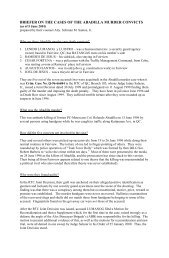Republic of the Philippines - Campaign
Republic of the Philippines - Campaign
Republic of the Philippines - Campaign
Create successful ePaper yourself
Turn your PDF publications into a flip-book with our unique Google optimized e-Paper software.
APPELLANTS’ BRIEF<br />
People <strong>of</strong> <strong>the</strong> <strong>Philippines</strong> vs. Fortuna, et. al.<br />
S. C. G. R. No. 141660-64<br />
in <strong>the</strong> Hall <strong>of</strong> Justice, on <strong>the</strong> 4 th floor.” (Joint Decision, p. 26, last paragraph, italics<br />
mine).<br />
So what if Joel was brought to <strong>the</strong> IBP Quezon City Chapter <strong>of</strong>fice (which was<br />
done under close police escort and with a police-prepared statement)? Was that enough<br />
to meet <strong>the</strong> required degree (if we may use this term again) <strong>of</strong> “competent and<br />
independent counsel preferably <strong>of</strong> his own choice” 11 and “adequate legal assistance” 12 ?<br />
According to jurisprudence, <strong>the</strong> right to counsel attaches upon police<br />
identification or line-up <strong>of</strong> suspects (U.S. vs. Wade, 388 U.S. 218; and People vs. Usman<br />
Hassan, 157 SCRA 261). And that <strong>the</strong> following are not deemed independent counsel:<br />
PAO lawyers, 13 police lawyers, 14 and prosecutors. 15 The right to counsel refers not to<br />
pro-forma and perfunctory counsel but to “effective and vigilant counsel” (People vs.<br />
Lucero, 244 SCRA 425; and People vs. Bacamante, 248 SCRA 47). And this covers<br />
not only <strong>the</strong> moment <strong>of</strong> signing a police-prepared statement but more importantly <strong>the</strong><br />
prior period <strong>of</strong> custodial investigation and tactical interrogation – “from <strong>the</strong> time <strong>the</strong><br />
confessant answers <strong>the</strong> first question asked by <strong>the</strong> investigating <strong>of</strong>ficer until <strong>the</strong> signing<br />
<strong>of</strong> <strong>the</strong> extra-judicial confession.” For violation <strong>of</strong> this right to effective and vigilant<br />
counsel in one case, <strong>the</strong> confession obtained despite assistance <strong>of</strong> counsel was excluded<br />
by <strong>the</strong> Supreme Court and <strong>the</strong> accused was ACQUITTED (People vs. Bacamante, 248<br />
SCRA 47).<br />
Violations <strong>of</strong> similar constitutional rights were likewise a ground for acquittal or<br />
dismissal in o<strong>the</strong>r cases. In one case, <strong>the</strong> long delay in <strong>the</strong> termination <strong>of</strong> <strong>the</strong> preliminary<br />
investigation was found to be violative <strong>of</strong> <strong>the</strong> constitutional rights <strong>of</strong> <strong>the</strong> accused to<br />
procedural due process and to speedy disposition <strong>of</strong> cases, <strong>the</strong> latter under <strong>the</strong><br />
Constitution’s Art. III, Sec. 16. Accordingly, <strong>the</strong> case was DISMISSED by <strong>the</strong> Supreme<br />
Court, as a matter <strong>of</strong> radical relief:<br />
11 Const., Art. III, Sec. 12(1).<br />
12 Const., Art. III, Sec. 11.<br />
13 People vs. Olvis (154 SCRA 513).<br />
14 People vs. Labuac (G.R. No. 80764, September 28, 1992).<br />
Page 91 <strong>of</strong> 127<br />
91




